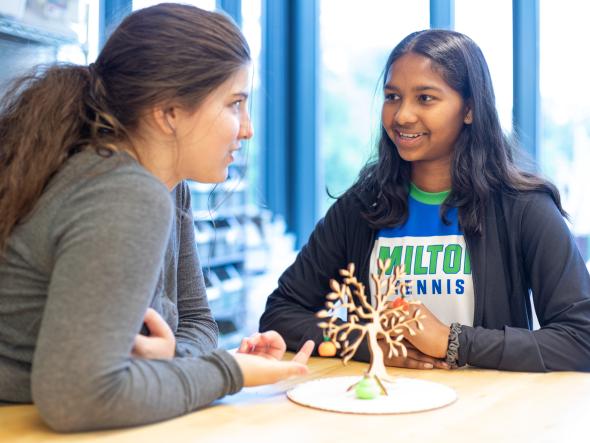Driven by both contemporary society and timeless Jewish sources, our Jewish day schools should be models of intentional community-building, meaning-making and relationship-driven culture. As part of that, I argue, Jewish schools should be at the forefront of a technological counterculture within our communities. Global concerns about smartphone and social media use, and their particular effects on adolescent health, are omnipresent. Parents and institutions feel impotent in the face of the powerful pull of notifications, persistent text messages and ever-new games and apps. Resources invested in personal technology are only rivaled by the money, energy and often frustration many parents pour into mechanisms to control or limit screen time, especially once it’s in a pocket-sized, go-everywhere device.
- Home
- HaYidion: The Prizmah Journal
- AI and Tech
- Changing the Default Settings
Changing the Default Settings

To be clear from the get-go, I am not advocating for a world or schools free of technology. I am writing this article in Google Docs with my phone perched next to my computer. In order to yield myself the Sunday time to write this article, I’m certain that my youngest child is currently watching Netflix. And yet, even in a society and within schools that embrace technology for all of the gifts and access it brings, we have a responsibility to approach our use mindfully and ensure that it’s helping, not hindering, our mission.
As institutions with influence over hundreds of families making sensitive and impactful decisions about the role of technology in their kids’ lives, it is our responsibility to give them the tools to make informed, strategic, collaborative and communal decisions, rather than be forced by the “default settings” of the world around us. Society’s current defaults of early access to smartphones and social media are actually not beyond our control. Parental hands often feel forced because of the network effect: “Everyone else has one!”; but with greater parent education and collaboration, we can shift to a model where each parent is making the optimal decision for their child, not one that is pre-prescribed or inevitable.
Parent-Driven Decision-Making Around Technology Use

To that end, I want to share some collective, non-technological ways to harness and delimit technology with our students. I recognize and appreciate that other Jewish schools are approaching this issue head-on and making recommendations directly from the administration (as Yael Krieger describes in this issue). Here, I present an alternate but complementary approach that depends on parents to drive the conversation among their peers. Our school, Milton Gottesman Jewish Day School of the Nation’s Capital, has piloted a parent-driven program that raises awareness and questions these defaults, with families binding together to make thoughtful technology choices, consider social media approaches and collectively delay smartphones for many students.
Here are the methods that we’ve used to approach this question in a way that speaks to our community ethos:
- Parents have driven the initiative through peer-to-peer outreach.
- Parents driving the process volunteered to reach out to families with whom they or their child already had a strong relationship.
- Recognizing the sensitivity of the subject and the level of personal choice, they wanted to be sure they we're broaching the matter appropriately.
- School has provided behind-the-scenes support, connecting parents to others with similar concerns, both in their grade level and others.
- School has provided parent education programs, particularly in dialogue with students, around digital citizenship and some of the vulnerabilities social media presents.
Parents worked hard to craft a message to their fellow parents that opened the conversation in a way that was free of judgment, while still stating their particular point of view. As a school with great pride in its culture of civil discourse, this process demanded the same of our parents:
“A group of fifth-grade parents has started a conversation about delaying smartphone acquisition during these formative years to help our children thrive. Delaying phone and social media acquisition has benefits in several realms including social, emotional and mental health. We want kids and parents to be free of peer pressure and not to make decisions based on claims that ‘everyone else is doing it.’ Each family will decide what is right for them and their kid(s). We invite you to engage with us in a thoughtful, pluralistic conversation among fifth grade parents. There is no pledge or ultimatum or anything of the sort. Just an effort to learn from each other and help our kids thrive in a values-based way.”
These emails, and the conversations that followed, yielded a large percentage of the class informally opting into smartphone delays. Responses ranged from “No thanks, that train has already left the station” and “Our older kids all got phones for their bnai mitzvahs and we don’t feel we can change it now” to “I’d love to talk about this more.”
Policies
The school, and our families, reinforce the pluralism of these decisions by having clear expectations within all school programs. We never expect or allow smartphone (or smartwatch) use at any school-sponsored event. Even, or especially, our immersive experiences are device-free. Eighth graders leave phones, tablets and computers at home when they travel to Israel. We believe it enhances their presence, especially in the precious in-between moments on the bus, and allows them to be fully engaged and immersed in the Israeli experience.
Our school is clear about its policies, in particular through its middle school and family handbooks. As a city school, we acknowledge the sense of need for many of our families whose children travel by public transport; we try to proactively anticipate and preempt other moments of potential contact. In all communications around events, we seek to provide a clear pickup time so students need not call parents to be picked up.

Here is what we share with both groups and enforce on a regular basis:
Cell Phone Usage (excerpt from Middle School Handbook)
Students may not use cellphones in the school building, including at arrival and dismissal and in all spaces of the building. When they are in the school building, students may not use watches that serve as a cellphone and are connected to the internet. If a student brings a cellphone to school to use in traveling to or from school, the phone must be stored inside a backpack for the entire time that the student is at school. If students need to call a parent or caregiver, they go to the front desk in the lobby and call using the school phone.
If a student uses or is seen with their cellphone at school, a teacher who sees the student with the cellphone will take the phone and give it to the main office or to a principal. The student and the principals will meet and carry through the following plan:
- After the student has used the phone one time at school, the student must turn in the phone each morning to the front desk upon arrival and may pick it up at dismissal for at least one week.
- If a student uses a cellphone a second time at school, the phone will be given to the principals. The student’s parent or caregiver will arrange with the school administration to pick up the phone. If a student needs a phone when traveling to or from school, we will work with the family on a plan for storing the phone at the front desk rather than in their backpack for an extended period.
With family-hosted events (mostly bnai mitzvahs), we encourage parents to be hyper-clear about the details of their event, including kashrut, Shabbat expectations and what services will be like. This helps families prepare their children for the range of Jewish practice we hope they’ll experience. Likewise, parents might share their hopes for technology at their events. One school family included the following in their pre-simchah email, with good success (and some kids surreptitiously using their phones in the coatroom, too):
Technology: While there are many fun advantages to having a Sunday simchah, we are also sad to lose the tech-free zone that Shabbat brings to these events, which seems to help everyone be completely present and connected to one another. In the hopes of creating that same kind of atmosphere all day, we invite parents to have their kids ditch their phones for the day. We promise there will be plenty of ways to stay busy as well as a photo booth for capturing unlimited photos. There shouldn’t be too much variation in end-time (2:30 pm) and Kind Parent (202-222-2222) has kindly offered to be the “go to” parent that day in case anything does come up and you need to get a message to your kid (or vice versa). If you/they prefer to have a space to safely stash their phones for the day, we are happy to help with that as well.
With rising concerns and growing data about smartphone usage, we have seen these initiatives spread quickly across the school, with parents of students as young as third grade beginning to initiate the process among their peers. When parents approach us, we nurture the idea, connect them with pioneers in other classes and reinforce that the approach should align with our pluralistic ethos: open-hearted, focused on dialogue and respectful of multiple pathways.





